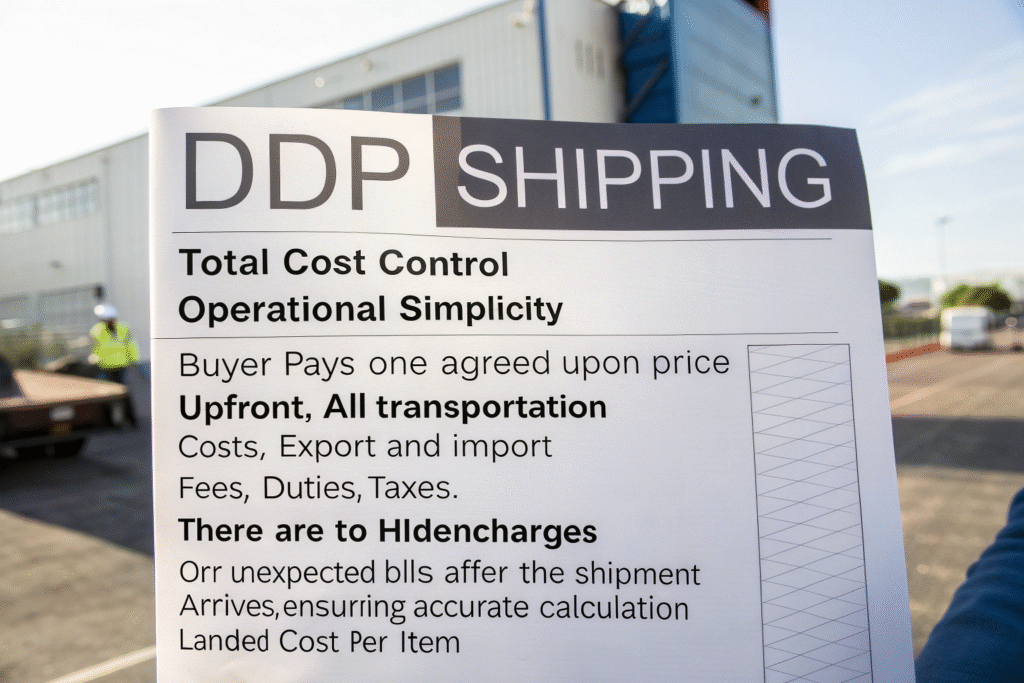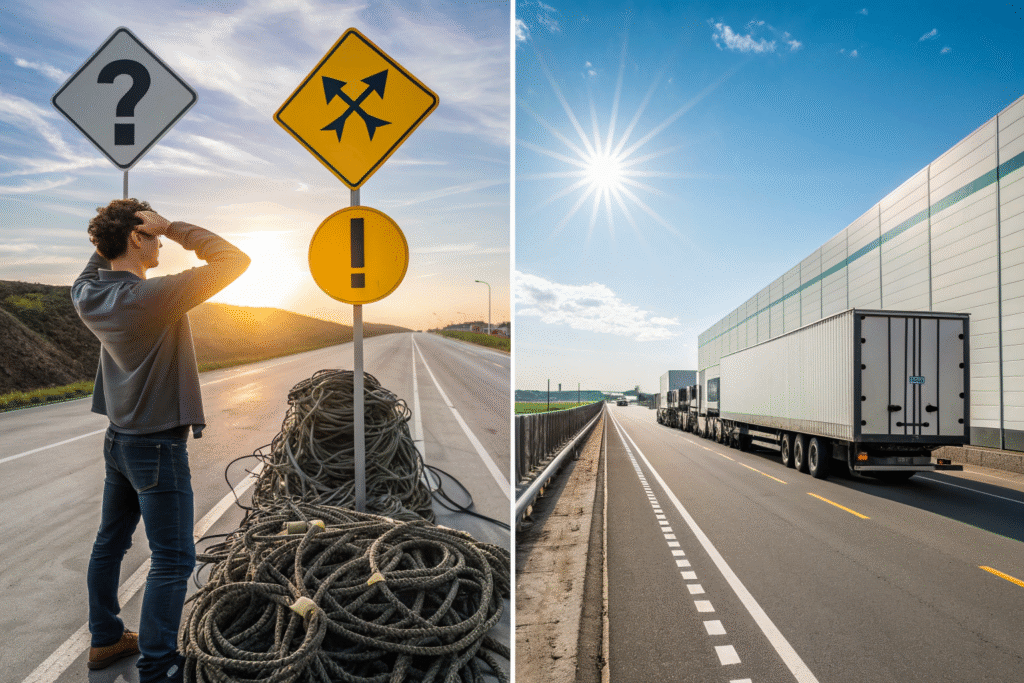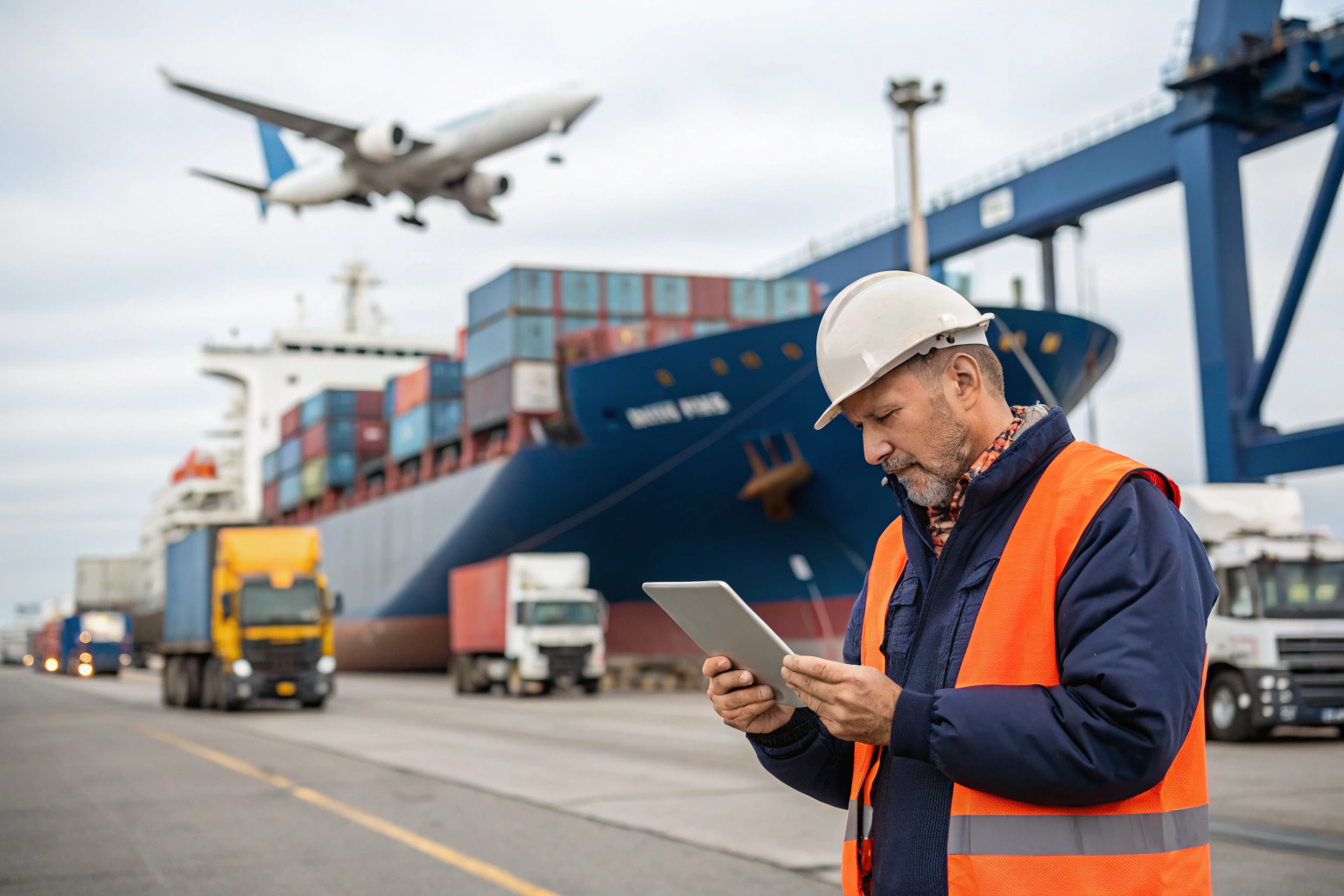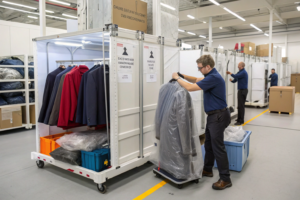As an e-commerce business owner, you're focused on selling products and growing your brand. But have you ever wondered what happens after you click "confirm" on your supplier's order? The journey your goods take from a factory in China to your warehouse in the U.S. is complex. It involves multiple steps, strict deadlines, and intricate logistics. A professional freight forwarder acts as your guide and manager for this entire process. We ensure your shipments are not just moved, but handled with care, efficiency, and strategic planning. Understanding this process is key to scaling your business without getting bogged down by logistical nightmares.
Freight forwarders handle e-commerce shipments by acting as a central manager for the entire supply chain. They coordinate the pickup of goods from your supplier, manage export customs clearance in the origin country, arrange the main international transport via sea or air, handle import customs clearance at the destination, and oversee the final delivery to your door. This end-to-end service, often called DDP (Delivered Duty Paid), provides a seamless, hassle-free shipping experience for e-commerce sellers, allowing them to focus on sales and marketing while experts handle the complex logistics.
The world of international shipping doesn't have to be intimidating. With the right partner, it becomes a powerful tool for business growth. Let's break down exactly how a freight forwarder like GeeseCargo manages your e-commerce shipments, turning a complex web of logistics into a smooth, reliable process.
What Are the Key Steps in E-commerce Freight Forwarding?
The journey of an e-commerce shipment is a well-orchestrated sequence of events. From the moment your production is complete to the second it arrives at your warehouse, each step is critical. Missing one can lead to delays, extra costs, and frustrated customers. A professional freight forwarder maps out this journey in advance, ensuring visibility and control at every stage.
The key steps begin with the origin services. We first collect the goods from your factory in China. Then, we handle the crucial step of export customs clearance. After that, we arrange the main international transport to the U.S. The process continues with import customs clearance upon arrival and finishes with the final trucking delivery to your warehouse. This entire chain is what we call a comprehensive door-to-door service.

How Does the Pickup and Origin Customs Process Work?
The process starts where your products are made. Once your goods are ready, we don't just wait for you to figure out the next move. Our local team coordinates directly with your supplier to schedule the pickup. We arrange for a truck to collect the cargo and transport it to our designated warehouse or a consolidation center. This is where the magic of efficiency begins. We often combine, or consolidate, shipments from multiple clients. This allows us to achieve better volume rates for the main international leg, savings we then pass on to you. Consolidation is a key strategy for reducing your overall shipping costs.
After pickup, the next critical step is export customs clearance. This is a legal requirement for any goods leaving China. Our experienced staff, who have strong contacts within major Chinese ports, manage all the necessary documentation. This includes the commercial invoice, packing list, and export declaration. We ensure everything is accurate and submitted on time, preventing any last-minute holds at the port. A smooth customs clearance at the origin sets the stage for a timely voyage. For businesses new to this, understanding the importance of customs clearance is fundamental to avoiding delays.
What Happens During International Transport and Destination Delivery?
Once your goods clear Chinese customs, they are loaded onto the chosen vessel or aircraft. For e-commerce shipments from China to the U.S., ocean freight is often the most cost-effective for large volumes, while air freight is used for urgent, high-value items. During this transit, our job is to monitor the shipment. We track its location and provide you with regular updates on the Estimated Time of Arrival (ETA). You are never left in the dark wondering where your inventory is.
Upon arrival at the U.S. port, the import customs clearance process begins. This is a major pain point for many importers, but our expertise makes it seamless. We work with our partners in the U.S. to handle the filing with U.S. Customs and Border Protection. We calculate and pay the required duties and tariffs on your behalf, a core part of our DDP service. This eliminates surprise costs and complexities for you. After customs releases the goods, we arrange for the final trucking to your warehouse. The entire process, from the port to your door, is managed by a single point of contact. This integrated approach to door-to-door shipping ensures a predictable and reliable supply chain.
Why Is DDP Shipping Ideal for E-commerce Businesses?
For e-commerce entrepreneurs, simplicity and predictability are everything. Unexpected costs and complex procedures can derail your budget and operations. Delivered Duty Paid (DDP) is an Incoterm that places the maximum responsibility on the seller, or in this case, your freight forwarder acting on your behalf. It is the ultimate solution for a hands-off, worry-free import experience.
DDP shipping is ideal because it provides total cost control and operational simplicity. As the buyer, you pay one agreed-upon price upfront. This price includes all transportation costs, export and import fees, duties, and taxes. There are no hidden charges or unexpected bills after the shipment arrives. This allows you to calculate your landed cost per item with absolute accuracy, which is crucial for pricing your products and managing your profit margins effectively.

How Does DDP Simplify Costing and Budgeting?
Financial planning is the backbone of a successful e-commerce business. Traditional shipping methods, where you are responsible for destination charges, create massive financial uncertainty. You might receive an invoice for customs duties, port fees, and trucking after your goods have already shipped. This makes it impossible to know your true profit until it's too late. DDP eliminates this problem entirely.
With our DDP service, you receive a comprehensive all-in quote before your shipment even begins. This quote covers everything from the factory pickup in China to the placement of the goods in your U.S. warehouse. You know the exact cost from the start. This transparency allows you to make informed business decisions. You can confidently run marketing campaigns and sales promotions because you know your exact cost of goods sold (COGS). This level of shipping cost predictability is a game-changer for scaling your business.
What Administrative Burdens Does DDP Remove?
Beyond financial predictability, DDP removes significant administrative burdens. Importing goods into the United States requires a significant amount of paperwork and compliance with various regulations. This includes filing the ISF (Importer Security Filing), managing customs bonds, and ensuring all product certifications are in order. For a business owner focused on marketing and sales, this can be a daunting and time-consuming task.
By choosing a DDP service like the one we provide at GeeseCargo, you transfer these responsibilities to us. Our team of experts handles all the complex documentation and regulatory requirements for both China and the U.S. We ensure full compliance, reducing the risk of your shipment being held, inspected, or penalized. This frees up your valuable time and resources, allowing you to concentrate on what you do best: growing your e-commerce brand. Leveraging our freight forwarding expertise means you have a dedicated partner managing the complexities of international trade law.
How to Choose a Reliable Freight Forwarder for E-commerce?
Your choice of a freight forwarder can make or break your import operation. It's not just about finding the cheapest rate; it's about finding a reliable partner you can trust with your inventory and, by extension, your business. A good forwarder provides stability, security, and expert guidance, while a poor one can cause delays, financial losses, and immense stress.
You should choose a reliable freight forwarder based on their experience, service transparency, and communication. Look for a company with a proven track record on your specific trade routes, like China to the U.S. They must offer clear, detailed quotes with no hidden fees. Most importantly, they must be proactive communicators, providing regular updates and being readily available to answer your questions. Your freight partner should feel like an extension of your own team.
| Selection Criteria | Why It Matters for E-commerce | What to Look For |
|---|---|---|
| Route Expertise | Knowledge of specific port procedures and local contacts. | A forwarder specializing in your lanes (e.g., Shanghai to LA). |
| Service Transparency | Avoids unexpected costs and ensures budget accuracy. | Detailed, all-in DDP quotes and a clear explanation of charges. |
| Communication | Provides peace of mind and allows for better planning. | A dedicated account manager and proactive tracking updates. |
| Technology | Offers real-time visibility into your shipment's status. | An online platform for tracking and document management. |

What Experience and Certifications Should You Look For?
Experience is not just a number of years in business; it's specific, relevant experience. For an e-commerce seller like you, shipping from China to the U.S., you need a forwarder with deep roots and strong contacts in both regions. Our many years of experience on European and American routes mean we understand the nuances of these specific shipping lanes. We know the peak seasons, the potential bottlenecks, and how to navigate them.
Furthermore, check for relevant certifications. While there are many in the industry, a forwarder that invests in its own compliance and training is generally more reliable. You should also verify their ability to handle the full logistics cycle. Can they manage both the origin and destination processes effectively? A forwarder with a strong network, like our contacts in major ports across Asia, Europe, and America, can solve problems quickly that would stall a less-connected company. This global logistics network is a critical asset for your supply chain's resilience.
Why Are Communication and Technology Non-Negotiable?
In e-commerce, speed is everything, and information is power. You cannot afford to work with a forwarder who is slow to respond or provides poor visibility. Consistent and clear communication is non-negotiable. You should have a direct line to your account manager who understands your business and can provide immediate assistance when needed.
Equally important is the technology platform the forwarder uses. A modern freight forwarder should provide you with an online dashboard where you can view real-time tracking, access your shipping documents, and see your shipment history. This technology empowers you to check the status of your goods 24/7 without having to send an email. It brings a level of transparency and control that is essential for modern business. At GeeseCargo, we leverage technology to provide this kind of real-time shipment tracking, giving our clients peace of mind and the information they need to plan their operations.
How Can You Optimize E-commerce Shipping Costs and Time?
Controlling logistics costs and transit times is a direct competitive advantage. In e-commerce, customers expect fast delivery and you need healthy margins. Optimizing your shipping isn't about always choosing the cheapest option; it's about making smart, strategic choices that balance cost, speed, and reliability. A skilled freight forwarder acts as your consultant to find this perfect balance.
You can optimize costs and time through smart consolidation, modal selection, and long-term planning. Consolidating smaller shipments into full container loads (FCL) or using air-sea combined solutions can dramatically reduce per-unit costs. Choosing the right mode of transport—air, sea, or rail—based on your product's urgency and value is also key. Finally, building a long-term partnership with your forwarder allows for better capacity planning and priority treatment during busy seasons.

What Is the Role of Consolidation and Modal Choice?
Consolidation is one of the most powerful tools for cost reduction. If your shipment is not large enough to fill a full container, it will be shipped as Less than Container Load (LCL). Instead of you arranging this individually, we group your LCL shipment with other compatible cargo from our clients. This allows us to book a full container at a much better rate than any single LCL shipper could get. The savings are then shared, significantly lowering your freight cost.
Modal choice is the strategic decision between air, sea, and rail freight. Each has its trade-offs:
- Air Freight: Best for high-value, low-volume, or urgently needed goods. It is the fastest but most expensive option.
- Sea Freight: The most economical for high-volume, low-urgency items like most e-commerce inventory. Understanding sea freight vs air freight costs is essential for budgeting.
- Rail Freight: An increasingly popular middle-ground option for certain land routes, offering a balance of cost and speed.
A good forwarder will advise you on the best mix to keep your supply chain stocked without overspending.
How Does Planning and Partnership Lead to Better Rates?
Procrastination is the enemy of low shipping costs. Booking your freight at the last minute often means you have to pay premium rates for whatever space is left. Proactive planning is the solution. By forecasting your shipping needs and providing your forwarder with a schedule, you allow them to book space on vessels or aircraft well in advance, securing the best possible rates.
This practice of forward planning is the foundation of a true partnership. When we understand your business cycle and volume, we can allocate capacity for you and provide more stable, predictable pricing. This long-term relationship benefits both parties. You get reliable service and competitive rates, and we get a loyal, growing client. This collaborative approach to supply chain management transforms logistics from a cost center into a strategic asset for your e-commerce business.
Conclusion
Navigating the complexities of international e-commerce shipping is a formidable task, but you don't have to do it alone. A professional freight forwarder handles your shipments by managing a coordinated sequence of steps: from factory pickup and customs clearance to international transport and final door delivery. The strategic use of DDP shipping simplifies costing and reduces administrative burdens, providing the predictability your business needs to thrive.
The key to success lies in choosing a reliable partner—one with specific route expertise, transparent communication, and a commitment to your business's growth. By leveraging tactics like consolidation and strategic modal choice, you can optimize both costs and transit times. At GeeseCargo, we bring years of experience on the China-U.S. route, a robust network, and a client-focused approach to ensure your e-commerce shipments are not just handled, but are handled professionally, reliably, and competitively. Let us manage the logistics, so you can focus on what you do best: building your brand and satisfying your customers.









